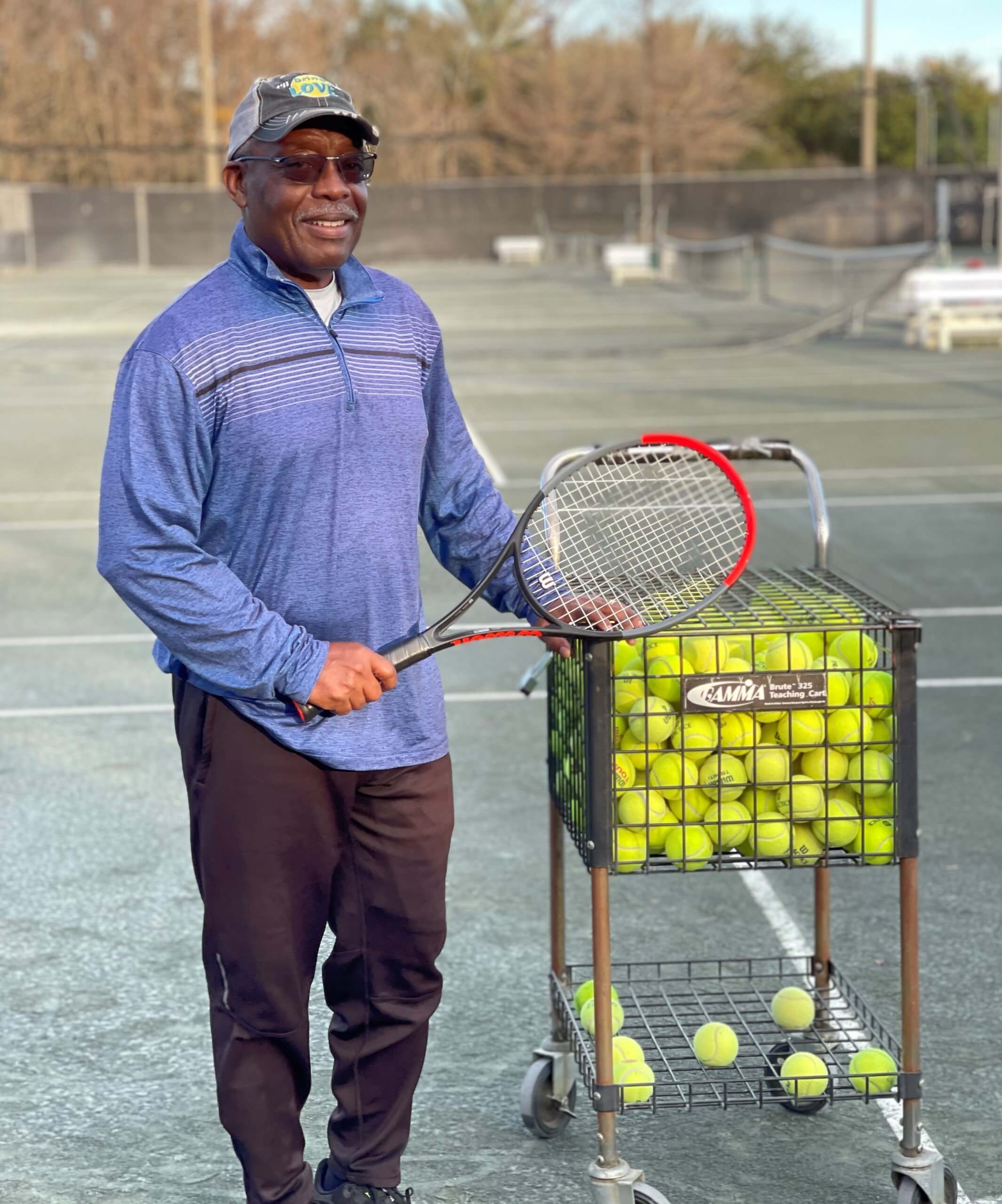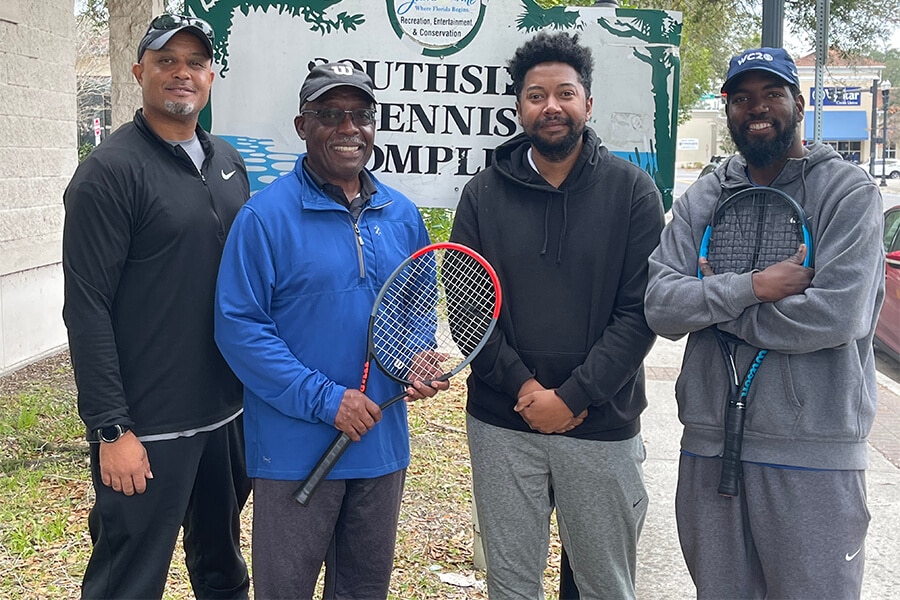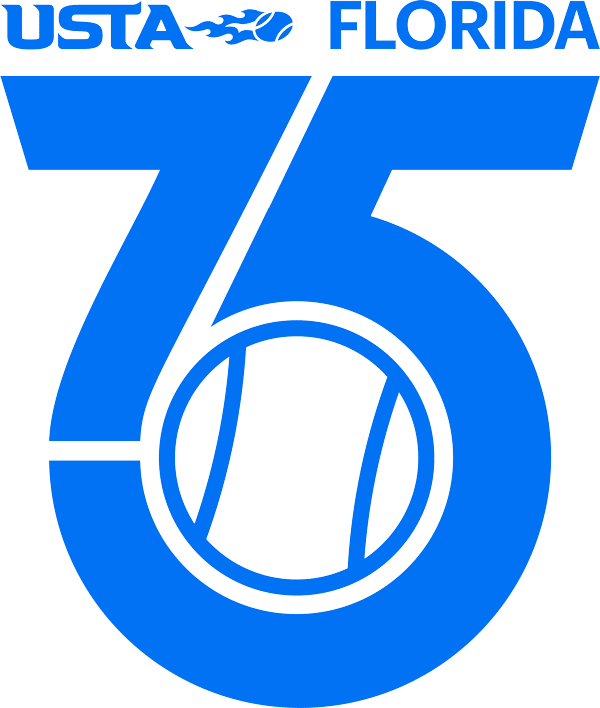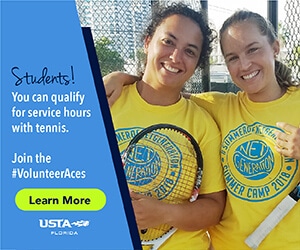In celebration of Black History Month, throughout February USTA Florida recognizes all of those in the Black community whose talents and dedication help to grow the great game of tennis every day — at every level. We applaud them all for making tennis a better and more inclusive sport, and for making the face of our game more accurately reflect the dynamic diversity of our country. As part of our coverage, USTA Florida has provided a platform for community members to be honest and open about their thoughts and experiences.
When many think of Jacksonville tennis, the name Harrell Thomas comes to mind. Thomas has been embedded in the Jacksonville tennis community for more than 35 years, and doesn’t have any plans on slowing down. The USPTA and PTR certified Elite Professional serves as the Tennis Facility Manager for the City of Jacksonville.
When did you first pick up a racquet and how did you get your start in tennis?
I first picked up a racquet at age of 15 while in high school and in between sports. I ended up trying out for my team and made it. I played last position singles as a tenth grader and fell in love with the sport and played nonstop. Once I was a senior I played tennis exclusively, despite being a three-sport athlete prior. I went on to attend Jacksonville University and made the tennis team in the fall of 1975, the same year Arthur Ashe won Wimbledon.

Harrell Thomas
What are some of the highlights that stand out in your tennis career?
Some of the highlights of my tennis career include:
- Meeting Arthur Ashe and doing a workshop with him at the Clanzel T. Brown Park Tennis Center here in Jacksonville
- Having the opportunity to meet and work with playing professionals on special projects
- Being asked to work on the grounds of the US Open during 1986 and meeting several professional athletes and celebrities
- Representing the City of Jacksonville in New York to receive the USTA Facility of the Year award in 2015
- Leading teams to local and regional championships, as well as individual and doubles championships
- Traveling to different areas and competing with friends and family
What is your history working in tennis before starting in your current position?
“May your choices reflect your hopes, not your fears.” – Mandela
I was first hired as a Tennis Professional in December 1986 at the Hendricks Ave Tennis Center (Southside Park) in Jacksonville. I helped develop and oversee summer youth tennis programs that led to extensive after-school programs for youth. Teaching tennis has been very rewarding; I have seen my students succeed in and outside of tennis. Several of my former students have gone on to become Tennis Teaching Professionals.
My relationships with some former students have also lasted well beyond the tennis courts. One student from my first year on the job went on to be a Division I scholarship athlete, an RN after college and then dedicated herself to becoming a Nun. We still keep in touch to this day. Throughout my 35+ years in tennis, I’ve had such an eclectic group of students.
As Tennis Facility Manager for the City of Jacksonville, when did you start this position and what do you do?
I was given the opportunity to serve as the Tennis Facility Manager in 2014, to oversee the three main tennis sites the city had at the time. My responsibilities include overseeing day-to-day operations of tennis pros, desk staff, maintenance staff, and development of future tennis programming city-wide. A typical day for me may include site visits, meeting with special interest groups, maintenance problem-solving, staffing needs in different areas of the division, and public access requests from teams and other groups. Since I’m very active with on-court teaching as well, my admin duties are mixed in throughout my day.
What have you learned by working for the Jacksonville Parks & Rec department?
I grew up in the public parks system and met several strong, impressive coaches who left an impressionable mark on my growth as an athlete. At that age, I had no clue that I would spend the majority of my life being a Coach. Municipal programs allow for the interaction of people from all walks of life. I have met and coached people from at least 14 different nations, and those are the ones I can recall. I’ve traveled and played in many places that if not for tennis, I wouldn’t have had the opportunity to visit. Being a native of Jacksonville and deeply rooted in the community, there was little evidence that teaching tennis professionally was an option. This journey has been filled with setbacks and salutations, and I try to take either as a seed for growth in stride. I believe I have added value and vision to tennis here in Jacksonville.
What is the most rewarding part of your job?
The most rewarding part of my present job is knowing that we are meeting or exceeding public needs, as well as seeing that players are developing and we have positive reviews about personnel, facilities and programs. Additionally, I want to help others be successful. Since being employed with the City of Jacksonville I have invested in continuing education of my trade, because being informed, along with my work ethic, has been my way to stay in tune.

Harrell Thomas with former students from L-R: William Kitchings, Devin Reddick, Mark Atkinson. Kitchings now works as a Recreation Specialist for the City of Jacksonville, Reddick is now a Tennis Professional with the City of Jacksonville, and Atkinson is the Head Tennis Professional with the MaliVai Washington Youth Foundation
What do you hope these tennis facilities and programs provide to the surrounding community?
With four locations around the city, our hope is that we can provide access for citizens from all walks of life. Multiple locations of neighborhood tennis facilities means that people don’t have to drive a long distance to be able to use a facility for their enjoyment as there may be one close by. Additionally, the more facilities we have available to the public in different areas of town, the more access to communities who may not have even known facilities like ours exist.
Why are public parks important for the long-term health and growth of tennis?
Our public parks are important for the long-term health and growth of the game as our parks, first and foremost, are for the public with access to the hard courts for free. The long-term benefits of playing tennis are well chronicled; it’s a lifetime activity and I believe anyone can find a level of play. Having a variety of programming is important as you need to have the ability to work with anyone regardless of their level. Furthermore, this allows for players to make connections to set up weekly games or discover teams that they can join to expand their experience within the sport.
Have you ever felt less valued in a tennis-related space because of your racial background?
“If there’s no struggle, there’s no progress.” – Fredrick Douglas
Early in my career and even still lately, there have been times where one can encounter individuals or situations where you’re typecasted because of the way you look. Sooner rather than later though, respect is given. I don’t feel less valued because I don’t allow someone else to stamp a value on my existence, personal or professional. My race is not a burden and I’m very proud of who I am – so many have endured much more than I. My success is on the shoulders of many trailblazers who sacrificed much for the betterment of all mankind.
What do you believe can be done to foster long-term change when it comes to racial inequality in Florida tennis? What do you think USTA Florida could do to strengthen its relationship with minority communities?
“Never be limited by other people’s limited imagination.” – Dr. Mae Jemison
Issues in Florida vary. What may be an issue in Miami could be different from issues in Orlando, Tampa, Tallahassee, or Jacksonville. I believe USTA Florida should strengthen their base through outreach and grassroots efforts. Identify those from a broad background who could help establish a path to growth within their communities. The infrastructure in many cases is weak; I believe brainstorming with locals and connecting with schools, YMCAs, after-school programs, Historical Black Colleges and Universities (HBCUs), Parks & Rec departments and other non-profit organizations can help build a stronger foundation through apprenticeships, internships and special initiatives.
Bringing community members into the conversation about how USTA Florida can create more of a connection to minority communities is important. Convene some of those individuals – whether players, coaches, educators, park directors – from different backgrounds and host a conference to develop some initiatives that USTA Florida could look at adopting.
Why is it important to celebrate Black History Month in general, as well as in tennis?
“It is not our differences that divide us. It is our inability to recognize, accept, and celebrate those differences.” – Audre Lorde
It’s extremely important to celebrate Black History Month because so much of our contributions to society have been untold. I got my start in recreation because tennis was not taught to youth in the summer, city-wide. My career began through NJTLs and teaching tennis to the masses. The Jacksonville NJTLs were volunteers and once I was given the reigns, I expanded access for youths across all parts of the city. The city recreation department was receptive then and continues to be. We have grown together. Challenges arise, change is inevitable. My work ethic and appetite for learning has prepared me for my professional evolution in tennis. Strong fundamentals and inclusiveness creates a better outcome than exclusiveness. Being unique is special in both a good and bad way – you stand out but yet you are subjected to isolation.
If you had to share your message of unity, what would it be?
I’m indebted to those known and unknown, who had and continue to have input in my development. Not all negative moments will completely derail your destiny.
USTA Florida believes tennis is for everyone. For more information about USTA Florida’s Amplify initiative, visit USTAFlorida.com/Amplify.


